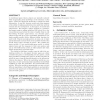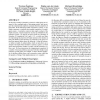294 search results - page 55 / 59 » The complexity of computing a Nash equilibrium |
126
click to vote
SIGECOM
2006
ACM
15 years 7 months ago
2006
ACM
In traditional game theory, players are typically endowed with exogenously given knowledge of the structure of the game—either full omniscient knowledge or partial but fixed in...
126
click to vote
SBP
2012
Springer
13 years 9 months ago
2012
Springer
Complex adaptive systems (CAS) modeling has become a common tool to study the behavioral dynamics of agents in a broad range of disciplines from ecology to economics. Many modelers...
106
click to vote
ATAL
2007
Springer
15 years 7 months ago
2007
Springer
We develop a model of normative systems in which agents are assumed to have multiple goals of increasing priority, and investigate the computational complexity and game theoretic ...
101
click to vote
AAAI
2007
15 years 3 months ago
2007
In normal scenarios, computer scientists often consider the number of states in a game to capture the difficulty of learning an equilibrium. However, players do not see games in ...
118
click to vote
PODS
2004
ACM
16 years 1 months ago
2004
ACM
We study the problem of answering queries over sources with limited access patterns. Given a first-order query Q, the problem is to decide whether there is an equivalent query whi...


